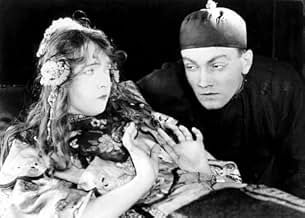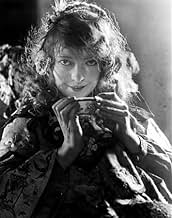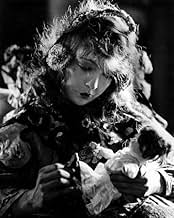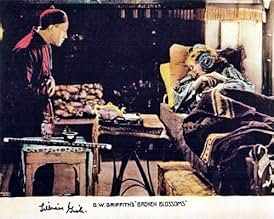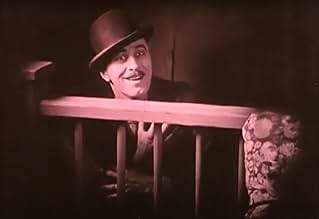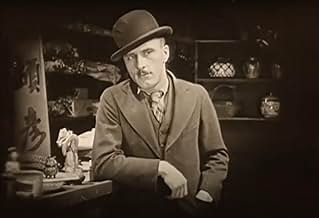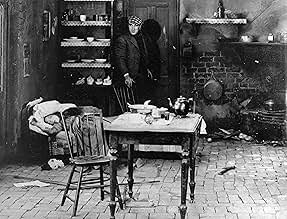IMDb RATING
7.2/10
12K
YOUR RATING
A frail waif, abused by her brutal boxer father in London's seedy Limehouse District, is befriended by a sensitive Chinese immigrant with tragic consequences.A frail waif, abused by her brutal boxer father in London's seedy Limehouse District, is befriended by a sensitive Chinese immigrant with tragic consequences.A frail waif, abused by her brutal boxer father in London's seedy Limehouse District, is befriended by a sensitive Chinese immigrant with tragic consequences.
- Director
- Writers
- Stars
- Awards
- 1 win total
Lillian Gish
- Lucy - The Girl
- (as Miss Lillian Gish)
Richard Barthelmess
- Cheng Huan - The Yellow Man
- (as Mr. Richard Barthelmess)
Edward Peil Sr.
- Evil Eye
- (as Edward Peil)
Ernest Butterworth
- Secondary Role
- (uncredited)
Frederic Hamen
- Secondary Role
- (uncredited)
Wilbur Higby
- London Policeman
- (uncredited)
Man-Ching Kwan
- Buddhist Monk
- (uncredited)
Bobbie Mack
- Ringside Employee
- (uncredited)
Moy Ming
- Minor Role
- (uncredited)
Steve Murphy
- Fight Spectator
- (uncredited)
George Nichols
- Police Constable
- (uncredited)
Karla Schramm
- Burrows' Girlfriend
- (uncredited)
Bessie Wong
- Girl in China
- (uncredited)
- Director
- Writers
- All cast & crew
- Production, box office & more at IMDbPro
Featured reviews
Turning away from the epic scale of his quintessential movies, Birth of a Nation and Intolerance, director D. W. Griffith turned to an altogether smaller and more intimate story in 1919. Instead of telling a vast tale spanning millennia and featuring a cast of thousands, he focused his attention on the tragic interplay between just three people: a Chinese immigrant to London (Richard Barthelmess), a young waif with whom he develops a brief but touching relationship (Lillian Gish), and her brutish father (Donald Crisp). It's been suggested this was another sop by Griffith to those who had accused him of being a racist due to the content of BoaN although, while Bathelmess' Chinese immigrant is a completely sympathetic character, the thoughtless racist attitudes that were commonplace back then are still very much in evidence. For example, the movie's secondary title is 'The Yellow Man and the Girl', and during a tender love scene, Gish's Lucy says to him: "Why are you so good to me, Chinky?" which tends to break the mood just a tad.
Griffith's trademark use of tiny gestures and changes of expression is very much in evidence in the performances of Barthelmess and Gish, while Crisp, who is barely recognisable as the kindly patriarch of countless 40s flicks, paints a broader picture of the loutish Battling Burrows. This counterpoint between screen father and daughter works well, stressing the fragile nature of Gish's waif, while emphasising the misery of her dependence upon her uncouth father. Barthelmess, meanwhile spends much of his time gazing miserably at the bleakness of the world around him as his character tries to lose himself in a haze of opium after failing to spread the word of peace. Chen seems to be moving through a dream for much of the film, passively allowing himself to be buffered by the world, and only shaking himself from his torpor when Lucy almost literally falls at his feet. This scene, in which Lucy and Chen first meet, is wonderfully atmospheric and beautifully framed and is, strangely, the prelude to the film's weakest segment. Having set the scene beautifully and created a great atmosphere, Griffith allows proceedings to slip into melodrama. While Battling's discovery of Lucy's new friendship is melodrama of the most Victorian kind, the relationship between the two potential lovers goes nowhere which, while perhaps true to the film's title, leaves the story struggling for momentum. Lucy enjoys a few hours of being spoiled by Chen the first time in her life that she ever has been, but there is very little interaction between them, and Chen's apparent consideration of forcing himself on Lucy before finally kissing her sleeve really doesn't ring true at all. In fact, the scene looks as if it were added almost as an afterthought to inject a little suspense.
Nevertheless, BROKEN BLOSSOMS is another example of one of the world's greatest directors operating at somewhere close to the top of his game. In another few years, Griffith's Victorian viewpoint would look horribly outdated to the Roaring Twenties crowd. There were still more classics to come, but in terms of technical and creative accomplishment he had already peaked.
Griffith's trademark use of tiny gestures and changes of expression is very much in evidence in the performances of Barthelmess and Gish, while Crisp, who is barely recognisable as the kindly patriarch of countless 40s flicks, paints a broader picture of the loutish Battling Burrows. This counterpoint between screen father and daughter works well, stressing the fragile nature of Gish's waif, while emphasising the misery of her dependence upon her uncouth father. Barthelmess, meanwhile spends much of his time gazing miserably at the bleakness of the world around him as his character tries to lose himself in a haze of opium after failing to spread the word of peace. Chen seems to be moving through a dream for much of the film, passively allowing himself to be buffered by the world, and only shaking himself from his torpor when Lucy almost literally falls at his feet. This scene, in which Lucy and Chen first meet, is wonderfully atmospheric and beautifully framed and is, strangely, the prelude to the film's weakest segment. Having set the scene beautifully and created a great atmosphere, Griffith allows proceedings to slip into melodrama. While Battling's discovery of Lucy's new friendship is melodrama of the most Victorian kind, the relationship between the two potential lovers goes nowhere which, while perhaps true to the film's title, leaves the story struggling for momentum. Lucy enjoys a few hours of being spoiled by Chen the first time in her life that she ever has been, but there is very little interaction between them, and Chen's apparent consideration of forcing himself on Lucy before finally kissing her sleeve really doesn't ring true at all. In fact, the scene looks as if it were added almost as an afterthought to inject a little suspense.
Nevertheless, BROKEN BLOSSOMS is another example of one of the world's greatest directors operating at somewhere close to the top of his game. In another few years, Griffith's Victorian viewpoint would look horribly outdated to the Roaring Twenties crowd. There were still more classics to come, but in terms of technical and creative accomplishment he had already peaked.
With some excellent acting performances and an interesting, memorable story, "Broken Blossoms" is one of the better pictures of the late 1910s, and it has held up rather well despite a couple of obvious signs of age. It would be hard to top Lillian Gish's performance as Lucy in any era, and Richard Barthelmess turns in a purposefully restrained and surprisingly effective performance in a role that was far from easy.
The story ties together several weighty themes, and most of them are still pertinent. This is the kind of movie that is sometimes considered to be dated, yet in terms of the main conflicts and struggles that the characters face, there are probably fewer differences between 1919 and 2004 than many might wish there to be. With material like this, it is also easy to allow it to become labored or heavy-handed. As it is, the tone is somber and austere throughout, yet most of the time this is in a thoughtful way.
Since Griffith's work is still so well-known and meets with such widely varying responses, it can sometimes be hard to evaluate his movies individually, without reference to the rest of his filmography. The story here is unusual enough in itself, with the different races and religions of the characters and the implied images represented by each of them. Each character is rather quickly defined as good or bad - a common state of affairs in Griffith movies - and as a result the story is told in a way that reflects that presumption, for better or for worse.
What is hard to deny is that the story and characters will stick with you afterwards. The impression that it leaves is not an entirely happy one, but the movie successfully evokes the humanity of all involved, which is a not unworthy goal and a not insignificant achievement.
The story ties together several weighty themes, and most of them are still pertinent. This is the kind of movie that is sometimes considered to be dated, yet in terms of the main conflicts and struggles that the characters face, there are probably fewer differences between 1919 and 2004 than many might wish there to be. With material like this, it is also easy to allow it to become labored or heavy-handed. As it is, the tone is somber and austere throughout, yet most of the time this is in a thoughtful way.
Since Griffith's work is still so well-known and meets with such widely varying responses, it can sometimes be hard to evaluate his movies individually, without reference to the rest of his filmography. The story here is unusual enough in itself, with the different races and religions of the characters and the implied images represented by each of them. Each character is rather quickly defined as good or bad - a common state of affairs in Griffith movies - and as a result the story is told in a way that reflects that presumption, for better or for worse.
What is hard to deny is that the story and characters will stick with you afterwards. The impression that it leaves is not an entirely happy one, but the movie successfully evokes the humanity of all involved, which is a not unworthy goal and a not insignificant achievement.
This has been one of my all-time favourite films since I taped it off UK Channel 4 1st October 1988 on its second showing, one to savour and revel in every few years. There really is no choice: the only version worth seeing is this one, the Brownlow & Gill UK remaster with Louis F. Gottchalk's themes lushly orchestrated by David Cullen and Carl Davis and the Thames Silents Orchestra. From a good silent film Broken Blossoms is beautifully transformed into a work of Art, the merger of the music and Billy Bitzer's visuals can be so striking. And the intelligent tinting was gorgeous too. Over the years I've even played it just for the music sometimes!
The story? Depressed Chinese ex-missionary in London falls under the spell of listless poverty-stricken beautiful white 15 yo daughter of violent boxer. The crafty and base whites think the worst, but we know that the yellow man's love remained pure - even his worst foe says this ... I know that most people today would hoot at the acting abilities displayed: Lillian Gish's pathetic submissiveness, Donald Crisp's over the top savage expressions and Richard Barthelmess's determinedly serious inscrutability, but appreciation of silent melodramas as a genre is really required rather than simply selecting just one film to watch, such as this. And then again some people have to get over a white man playing a Chinese man whilst simultaneously approving of miscegenation in these much more enlightened times! Would these same people be bothered if a Chinese played a white man? Along with Birth of a Nation and Intolerance, this was Griffiths' best work, pinnacles of the cinema.
Utterly spellbinding poetic stuff for the enlightened, dreadful if your favourites are cgi-riddled and no older than 6 months. And don't expect a remotely happy ending! The beauty that all the world missed smote him to the heart (paraphrase).
The story? Depressed Chinese ex-missionary in London falls under the spell of listless poverty-stricken beautiful white 15 yo daughter of violent boxer. The crafty and base whites think the worst, but we know that the yellow man's love remained pure - even his worst foe says this ... I know that most people today would hoot at the acting abilities displayed: Lillian Gish's pathetic submissiveness, Donald Crisp's over the top savage expressions and Richard Barthelmess's determinedly serious inscrutability, but appreciation of silent melodramas as a genre is really required rather than simply selecting just one film to watch, such as this. And then again some people have to get over a white man playing a Chinese man whilst simultaneously approving of miscegenation in these much more enlightened times! Would these same people be bothered if a Chinese played a white man? Along with Birth of a Nation and Intolerance, this was Griffiths' best work, pinnacles of the cinema.
Utterly spellbinding poetic stuff for the enlightened, dreadful if your favourites are cgi-riddled and no older than 6 months. And don't expect a remotely happy ending! The beauty that all the world missed smote him to the heart (paraphrase).
Many people believe the best Griffith film is "Intolerance"; some stand by "Way Down East" and still others believe in "Birth of a Nation" despite all its problems. However, I think "Broken Blossoms" is the Griffith film which stands the test of time and still rings true today, over 83 years from its debut.
"Broken Blossoms" is the story of two wounded, abused, seemingly hopeless individuals who find comfort and strength in one another. The Chinaman (played by Richard Barthelmess) and little Lucy Burrows (played by Lillian Gish) are as different as night is to day, however they complement each other and give each other what the other needs; Lucy gives the Chinaman respect as a human being, he in turn gives Lucy affection and love.
What happens to the two souls is, in my opinion, one of the most heartbreaking turn of events ever filmed. The brutal treatment of Lucy by her father and the ultimate sadness of the Chinaman at the end of the film always reduce me to tears.
Those who believe that silent movies are inferior to today's craft really needs to see "Broken Blossoms" and open their hearts and minds to a world that is beyond beauty and beyond pain.
"Broken Blossoms" is the story of two wounded, abused, seemingly hopeless individuals who find comfort and strength in one another. The Chinaman (played by Richard Barthelmess) and little Lucy Burrows (played by Lillian Gish) are as different as night is to day, however they complement each other and give each other what the other needs; Lucy gives the Chinaman respect as a human being, he in turn gives Lucy affection and love.
What happens to the two souls is, in my opinion, one of the most heartbreaking turn of events ever filmed. The brutal treatment of Lucy by her father and the ultimate sadness of the Chinaman at the end of the film always reduce me to tears.
Those who believe that silent movies are inferior to today's craft really needs to see "Broken Blossoms" and open their hearts and minds to a world that is beyond beauty and beyond pain.
The subjects this film deals with are ugly, but the whole thing is done in a beautiful way.
Subjects dealt with are racism, poverty and the reasons why.
The way Griffith deals with these subjects is the contrasts settings. Look at the room above the Chinaman's shop: opulent, festooned with the finest oriental silk. Compare that with the stark squalor of the abode of Lucy and her bruiser of a father. Then there is the education and sophistication of the orientals compared to the simplistic, ill-thought-out racial prejudice of Battling and his cronies.
I also enjoyed the boxing match. Very realistic - not the fantastic nonsense of your Rocky-type bout where a man all but beaten to a jelly suddenly pulls some heavy punches from nowhere and wins the fight.
The acting, as has been mentioned elsewhere, is terrific from all three of the principal characters. Also, their characters are well-drawn. Even Battling Burrows - complete with cauliflower ear - is more than a mere heavy: he boxes for a living, he drinks, he lives in a slum with few worldly possessions. Why?
I find it hard to believe that the films they make nowadays are nowhere near as good as this. Whatever happened to progress?
This film spawned the famous song "Limehouse Blues."
Subjects dealt with are racism, poverty and the reasons why.
The way Griffith deals with these subjects is the contrasts settings. Look at the room above the Chinaman's shop: opulent, festooned with the finest oriental silk. Compare that with the stark squalor of the abode of Lucy and her bruiser of a father. Then there is the education and sophistication of the orientals compared to the simplistic, ill-thought-out racial prejudice of Battling and his cronies.
I also enjoyed the boxing match. Very realistic - not the fantastic nonsense of your Rocky-type bout where a man all but beaten to a jelly suddenly pulls some heavy punches from nowhere and wins the fight.
The acting, as has been mentioned elsewhere, is terrific from all three of the principal characters. Also, their characters are well-drawn. Even Battling Burrows - complete with cauliflower ear - is more than a mere heavy: he boxes for a living, he drinks, he lives in a slum with few worldly possessions. Why?
I find it hard to believe that the films they make nowadays are nowhere near as good as this. Whatever happened to progress?
This film spawned the famous song "Limehouse Blues."
Did you know
- TriviaThe film was produced by D.W. Griffith for Adolph Zukor's Artcraft company, a subsidiary of Paramount Pictures. However, when Griffith delivered the final print of the film to Zukor, the producer was outraged. "How dare you deliver such a terrible film to me!" Zukor raged. "Everybody in the picture dies!" Infuriated, Griffith left Zukor's office and returned the next day with $250,000 in cash, which he threw on Zukor's desk. "Here," Griffith shouted, "If you don't want the picture, I'll buy it back from you." Zukor accepted the offer, thus making this the first film released by United Artists, the production company formed in 1919 by Mary Pickford, Charles Chaplin, Douglas Fairbanks, and Griffith. It was a remarkably successful film, both critically and at the box office.
- GoofsThe intertitles state, "The Buddha says, 'What thou dost not want others to do thee, do thou not to others.'" It was actually not the Buddha but Confucius' teaching.
- Quotes
Lucy Burrows: Don't do it, Daddy! You'll hit me once too often - and then they'll - they'll hang yer!
- ConnectionsFeatured in The Philco Television Playhouse: The Birth of the Movies (1951)
- How long is Broken Blossoms?Powered by Alexa
Details
Box office
- Budget
- $88,000 (estimated)
- Runtime1 hour 30 minutes
- Sound mix
- Aspect ratio
- 1.33 : 1
Contribute to this page
Suggest an edit or add missing content


